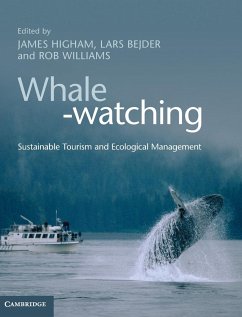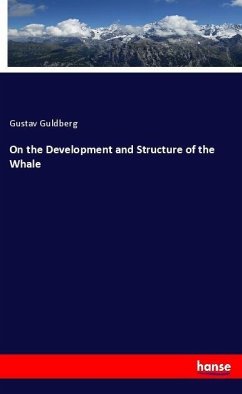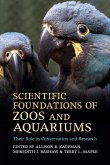Whale-watching
Herausgeber: Higham, James; Williams, Rob; Bejder, Lars
Whale-watching
Herausgeber: Higham, James; Williams, Rob; Bejder, Lars
- Gebundenes Buch
- Merkliste
- Auf die Merkliste
- Bewerten Bewerten
- Teilen
- Produkt teilen
- Produkterinnerung
- Produkterinnerung
A critical insight into the diverse socio-cultural, political, economic and ecological contexts of the global whale-watching industry.
Andere Kunden interessierten sich auch für
![On the Development and Structure of the Whale On the Development and Structure of the Whale]() Gustav GuldbergOn the Development and Structure of the Whale16,90 €
Gustav GuldbergOn the Development and Structure of the Whale16,90 €![The Whale Fishery and Its Appliances The Whale Fishery and Its Appliances]() James Temple BrownThe Whale Fishery and Its Appliances16,90 €
James Temple BrownThe Whale Fishery and Its Appliances16,90 €![Scientific Foundations of Zoos and Aquariums Scientific Foundations of Zoos and Aquariums]() Scientific Foundations of Zoos and Aquariums100,99 €
Scientific Foundations of Zoos and Aquariums100,99 €![Biodiversity in Dead Wood Biodiversity in Dead Wood]() Jogier. N StoklandBiodiversity in Dead Wood118,99 €
Jogier. N StoklandBiodiversity in Dead Wood118,99 €![Vegetation Ecology of Central Europe Vegetation Ecology of Central Europe]() Heinz H. EllenbergVegetation Ecology of Central Europe85,99 €
Heinz H. EllenbergVegetation Ecology of Central Europe85,99 €![Urban Ecology Urban Ecology]() Urban Ecology87,99 €
Urban Ecology87,99 €![Elements of Mathematical Ecology Elements of Mathematical Ecology]() Mark KotElements of Mathematical Ecology122,99 €
Mark KotElements of Mathematical Ecology122,99 €-
-
-
A critical insight into the diverse socio-cultural, political, economic and ecological contexts of the global whale-watching industry.
Hinweis: Dieser Artikel kann nur an eine deutsche Lieferadresse ausgeliefert werden.
Hinweis: Dieser Artikel kann nur an eine deutsche Lieferadresse ausgeliefert werden.
Produktdetails
- Produktdetails
- Verlag: Cambridge University Press
- Seitenzahl: 424
- Erscheinungstermin: 27. März 2014
- Englisch
- Abmessung: 260mm x 208mm x 27mm
- Gewicht: 1127g
- ISBN-13: 9780521195973
- ISBN-10: 0521195977
- Artikelnr.: 39632688
- Herstellerkennzeichnung
- Libri GmbH
- Europaallee 1
- 36244 Bad Hersfeld
- gpsr@libri.de
- Verlag: Cambridge University Press
- Seitenzahl: 424
- Erscheinungstermin: 27. März 2014
- Englisch
- Abmessung: 260mm x 208mm x 27mm
- Gewicht: 1127g
- ISBN-13: 9780521195973
- ISBN-10: 0521195977
- Artikelnr.: 39632688
- Herstellerkennzeichnung
- Libri GmbH
- Europaallee 1
- 36244 Bad Hersfeld
- gpsr@libri.de
List of contributors; Acknowledgements; Introduction; 1. Tourism, cetaceans
and sustainable development: moving beyond simple binaries and intuitive
assumptions James Higham, Lars Bejder and Rob Williams; Part I. The
Historical and Contemporary Contexts: 2. Threats facing cetacean
populations: the global context Rob Williams; 3. From adoration to
exploitation: the historical and contemporary contexts of human-cetacean
interactions Simon J. Allen; 4. Human attitudes and values: tradition
versus transformation Peter Corkeron; 5. The whale-watch industry:
historical development Erich Hoyt and Chris Parsons; 6. The International
Whaling Commission (IWC) and whale-watching Carole Carlson, Naomi Rose,
Hidehiro Kato and Rob Williams; Part II. Human Dimensions of
Whale-Watching: 7. The whaling versus whale watching debate: the resumption
of Icelandic whaling Marianne Helene Rasmussen; 8. Iceland and the
resumption of whaling: an empirical study of the attitudes of international
tourists and whale-watch tour operators Tommy Andersson, Beatrice Wende and
Susanna Gothall; 9. Green messengers or nature's spectacle: understanding
visitor experiences of wild cetacean tours Heather Zeppel and Sue Muloin;
10. Whale-watching: an effective education programme is no fluke Genevieve
Johnson and Cynde McInnis; 11. What's in it for the whales? Exploring the
potential contribution of environmental interpretation to conservation Mark
Orams, Paul Forestell and Jonathon Spring; 12. Integrating traditional
ecological knowledge and community engagement in marine mammal protected
areas Naomi McIntosh, Kep¿ Maly and John N. Kittinger; Part III. Ecological
Dimensions of Whale-Watching: 13. Understanding the ecological effects of
whale-watching on cetaceans Fredrik Christiansen and David Lusseau; 14.
Whale-watching and behavioural ecology Rochelle Constantine; 15. Energetic
linkages between short-term and long-term effects of whale-watching
disturbance on cetaceans: an example drawn from northeast Pacific resident
killer whales David E. Bain, Rob Williams and Andrew W. Trites; 16.
Ecological constraints and the propensity for population consequences of
whale-watching disturbances David Lusseau; 17. The use of area-time
closures as a tool to manage cetacean-watch tourism Julian Tyne, Neil
Loneragen and Lars Bejder; Part IV. Sustainable Management - Insights and
Issues: 18. The socioeconomic, educational and legal aspects of
whale-watching: a Scottish case study Chris Parsons; 19. Vigilance,
resilience and failures of science and management: spinner dolphins and
tourism in Hawai'i David W. Johnston; 20. A multi-agent model to simulate
whale-watching tours: the case of the St Lawrence Estuary in Quebec, Canada
Clément Chion, Jacques-André Landry, Lael Parrott, Danielle Marceau,
Philippe Lamontagne, Samuel Turgeon, Robert Michaud, Cristiane C. A.
Martins, Nadia Ménard, Guy Cantin and Suzan Dionne; 21. Cetacean-watching
in developing countries: a case study from the Mekong River Isabel Beasley,
Lars Bejder and Helene Marsh; 22. Whale-watching and community development:
the Kaikoura (New Zealand) story David G. Simmons; 23. Management of dusky
dolphin tourism at Kaikoura (New Zealand) David Lundquist; 24. Save the
whales part 2: a new science advocacy communication framework Wiebke
Finkler; 25. Time to rethink: fostering the nascent 'sustainability
paradigm' James Higham, Lars Bejder and Rob Williams; Index.
and sustainable development: moving beyond simple binaries and intuitive
assumptions James Higham, Lars Bejder and Rob Williams; Part I. The
Historical and Contemporary Contexts: 2. Threats facing cetacean
populations: the global context Rob Williams; 3. From adoration to
exploitation: the historical and contemporary contexts of human-cetacean
interactions Simon J. Allen; 4. Human attitudes and values: tradition
versus transformation Peter Corkeron; 5. The whale-watch industry:
historical development Erich Hoyt and Chris Parsons; 6. The International
Whaling Commission (IWC) and whale-watching Carole Carlson, Naomi Rose,
Hidehiro Kato and Rob Williams; Part II. Human Dimensions of
Whale-Watching: 7. The whaling versus whale watching debate: the resumption
of Icelandic whaling Marianne Helene Rasmussen; 8. Iceland and the
resumption of whaling: an empirical study of the attitudes of international
tourists and whale-watch tour operators Tommy Andersson, Beatrice Wende and
Susanna Gothall; 9. Green messengers or nature's spectacle: understanding
visitor experiences of wild cetacean tours Heather Zeppel and Sue Muloin;
10. Whale-watching: an effective education programme is no fluke Genevieve
Johnson and Cynde McInnis; 11. What's in it for the whales? Exploring the
potential contribution of environmental interpretation to conservation Mark
Orams, Paul Forestell and Jonathon Spring; 12. Integrating traditional
ecological knowledge and community engagement in marine mammal protected
areas Naomi McIntosh, Kep¿ Maly and John N. Kittinger; Part III. Ecological
Dimensions of Whale-Watching: 13. Understanding the ecological effects of
whale-watching on cetaceans Fredrik Christiansen and David Lusseau; 14.
Whale-watching and behavioural ecology Rochelle Constantine; 15. Energetic
linkages between short-term and long-term effects of whale-watching
disturbance on cetaceans: an example drawn from northeast Pacific resident
killer whales David E. Bain, Rob Williams and Andrew W. Trites; 16.
Ecological constraints and the propensity for population consequences of
whale-watching disturbances David Lusseau; 17. The use of area-time
closures as a tool to manage cetacean-watch tourism Julian Tyne, Neil
Loneragen and Lars Bejder; Part IV. Sustainable Management - Insights and
Issues: 18. The socioeconomic, educational and legal aspects of
whale-watching: a Scottish case study Chris Parsons; 19. Vigilance,
resilience and failures of science and management: spinner dolphins and
tourism in Hawai'i David W. Johnston; 20. A multi-agent model to simulate
whale-watching tours: the case of the St Lawrence Estuary in Quebec, Canada
Clément Chion, Jacques-André Landry, Lael Parrott, Danielle Marceau,
Philippe Lamontagne, Samuel Turgeon, Robert Michaud, Cristiane C. A.
Martins, Nadia Ménard, Guy Cantin and Suzan Dionne; 21. Cetacean-watching
in developing countries: a case study from the Mekong River Isabel Beasley,
Lars Bejder and Helene Marsh; 22. Whale-watching and community development:
the Kaikoura (New Zealand) story David G. Simmons; 23. Management of dusky
dolphin tourism at Kaikoura (New Zealand) David Lundquist; 24. Save the
whales part 2: a new science advocacy communication framework Wiebke
Finkler; 25. Time to rethink: fostering the nascent 'sustainability
paradigm' James Higham, Lars Bejder and Rob Williams; Index.
List of contributors; Acknowledgements; Introduction; 1. Tourism, cetaceans
and sustainable development: moving beyond simple binaries and intuitive
assumptions James Higham, Lars Bejder and Rob Williams; Part I. The
Historical and Contemporary Contexts: 2. Threats facing cetacean
populations: the global context Rob Williams; 3. From adoration to
exploitation: the historical and contemporary contexts of human-cetacean
interactions Simon J. Allen; 4. Human attitudes and values: tradition
versus transformation Peter Corkeron; 5. The whale-watch industry:
historical development Erich Hoyt and Chris Parsons; 6. The International
Whaling Commission (IWC) and whale-watching Carole Carlson, Naomi Rose,
Hidehiro Kato and Rob Williams; Part II. Human Dimensions of
Whale-Watching: 7. The whaling versus whale watching debate: the resumption
of Icelandic whaling Marianne Helene Rasmussen; 8. Iceland and the
resumption of whaling: an empirical study of the attitudes of international
tourists and whale-watch tour operators Tommy Andersson, Beatrice Wende and
Susanna Gothall; 9. Green messengers or nature's spectacle: understanding
visitor experiences of wild cetacean tours Heather Zeppel and Sue Muloin;
10. Whale-watching: an effective education programme is no fluke Genevieve
Johnson and Cynde McInnis; 11. What's in it for the whales? Exploring the
potential contribution of environmental interpretation to conservation Mark
Orams, Paul Forestell and Jonathon Spring; 12. Integrating traditional
ecological knowledge and community engagement in marine mammal protected
areas Naomi McIntosh, Kep¿ Maly and John N. Kittinger; Part III. Ecological
Dimensions of Whale-Watching: 13. Understanding the ecological effects of
whale-watching on cetaceans Fredrik Christiansen and David Lusseau; 14.
Whale-watching and behavioural ecology Rochelle Constantine; 15. Energetic
linkages between short-term and long-term effects of whale-watching
disturbance on cetaceans: an example drawn from northeast Pacific resident
killer whales David E. Bain, Rob Williams and Andrew W. Trites; 16.
Ecological constraints and the propensity for population consequences of
whale-watching disturbances David Lusseau; 17. The use of area-time
closures as a tool to manage cetacean-watch tourism Julian Tyne, Neil
Loneragen and Lars Bejder; Part IV. Sustainable Management - Insights and
Issues: 18. The socioeconomic, educational and legal aspects of
whale-watching: a Scottish case study Chris Parsons; 19. Vigilance,
resilience and failures of science and management: spinner dolphins and
tourism in Hawai'i David W. Johnston; 20. A multi-agent model to simulate
whale-watching tours: the case of the St Lawrence Estuary in Quebec, Canada
Clément Chion, Jacques-André Landry, Lael Parrott, Danielle Marceau,
Philippe Lamontagne, Samuel Turgeon, Robert Michaud, Cristiane C. A.
Martins, Nadia Ménard, Guy Cantin and Suzan Dionne; 21. Cetacean-watching
in developing countries: a case study from the Mekong River Isabel Beasley,
Lars Bejder and Helene Marsh; 22. Whale-watching and community development:
the Kaikoura (New Zealand) story David G. Simmons; 23. Management of dusky
dolphin tourism at Kaikoura (New Zealand) David Lundquist; 24. Save the
whales part 2: a new science advocacy communication framework Wiebke
Finkler; 25. Time to rethink: fostering the nascent 'sustainability
paradigm' James Higham, Lars Bejder and Rob Williams; Index.
and sustainable development: moving beyond simple binaries and intuitive
assumptions James Higham, Lars Bejder and Rob Williams; Part I. The
Historical and Contemporary Contexts: 2. Threats facing cetacean
populations: the global context Rob Williams; 3. From adoration to
exploitation: the historical and contemporary contexts of human-cetacean
interactions Simon J. Allen; 4. Human attitudes and values: tradition
versus transformation Peter Corkeron; 5. The whale-watch industry:
historical development Erich Hoyt and Chris Parsons; 6. The International
Whaling Commission (IWC) and whale-watching Carole Carlson, Naomi Rose,
Hidehiro Kato and Rob Williams; Part II. Human Dimensions of
Whale-Watching: 7. The whaling versus whale watching debate: the resumption
of Icelandic whaling Marianne Helene Rasmussen; 8. Iceland and the
resumption of whaling: an empirical study of the attitudes of international
tourists and whale-watch tour operators Tommy Andersson, Beatrice Wende and
Susanna Gothall; 9. Green messengers or nature's spectacle: understanding
visitor experiences of wild cetacean tours Heather Zeppel and Sue Muloin;
10. Whale-watching: an effective education programme is no fluke Genevieve
Johnson and Cynde McInnis; 11. What's in it for the whales? Exploring the
potential contribution of environmental interpretation to conservation Mark
Orams, Paul Forestell and Jonathon Spring; 12. Integrating traditional
ecological knowledge and community engagement in marine mammal protected
areas Naomi McIntosh, Kep¿ Maly and John N. Kittinger; Part III. Ecological
Dimensions of Whale-Watching: 13. Understanding the ecological effects of
whale-watching on cetaceans Fredrik Christiansen and David Lusseau; 14.
Whale-watching and behavioural ecology Rochelle Constantine; 15. Energetic
linkages between short-term and long-term effects of whale-watching
disturbance on cetaceans: an example drawn from northeast Pacific resident
killer whales David E. Bain, Rob Williams and Andrew W. Trites; 16.
Ecological constraints and the propensity for population consequences of
whale-watching disturbances David Lusseau; 17. The use of area-time
closures as a tool to manage cetacean-watch tourism Julian Tyne, Neil
Loneragen and Lars Bejder; Part IV. Sustainable Management - Insights and
Issues: 18. The socioeconomic, educational and legal aspects of
whale-watching: a Scottish case study Chris Parsons; 19. Vigilance,
resilience and failures of science and management: spinner dolphins and
tourism in Hawai'i David W. Johnston; 20. A multi-agent model to simulate
whale-watching tours: the case of the St Lawrence Estuary in Quebec, Canada
Clément Chion, Jacques-André Landry, Lael Parrott, Danielle Marceau,
Philippe Lamontagne, Samuel Turgeon, Robert Michaud, Cristiane C. A.
Martins, Nadia Ménard, Guy Cantin and Suzan Dionne; 21. Cetacean-watching
in developing countries: a case study from the Mekong River Isabel Beasley,
Lars Bejder and Helene Marsh; 22. Whale-watching and community development:
the Kaikoura (New Zealand) story David G. Simmons; 23. Management of dusky
dolphin tourism at Kaikoura (New Zealand) David Lundquist; 24. Save the
whales part 2: a new science advocacy communication framework Wiebke
Finkler; 25. Time to rethink: fostering the nascent 'sustainability
paradigm' James Higham, Lars Bejder and Rob Williams; Index.








